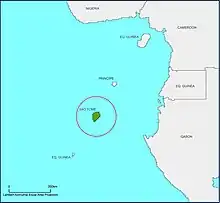São Tomé grosbeak
The São Tomé grosbeak (Crithagra concolor) is the largest member of the canary genus Crithagra,[2] 50% heavier than the next largest canary species,[3] and possesses a massive bill for a member of that genus. It is endemic to the island of São Tomé.[1]
| São Tomé grosbeak | |
|---|---|
| Scientific classification | |
| Domain: | Eukaryota |
| Kingdom: | Animalia |
| Phylum: | Chordata |
| Clade: | Dinosauria |
| Class: | Aves |
| Order: | Passeriformes |
| Family: | Fringillidae |
| Subfamily: | Carduelinae |
| Genus: | Crithagra |
| Species: | C. concolor |
| Binomial name | |
| Crithagra concolor (Barboza du Bocage, 1888) | |
 | |
| range | |
| Synonyms | |
| |
For a long period this bird was known only from three nineteenth-century specimens. It was rediscovered in 1991. The current population is estimated at less than 250, and it is classified as critically endangered by the IUCN.[1] The main threat is habitat destruction.
The São Tomé grosbeak was formerly placed in the genus Neospiza (meaning "new finch"[2]) but was assigned to the genus Crithagra based on a phylogenetic analysis of mitochondrial and nuclear DNA sequences.[4][5]
References
- BirdLife International (2018). "Crithagra concolor". IUCN Red List of Threatened Species. 2018: e.T22720310A128249895. doi:10.2305/IUCN.UK.2018-2.RLTS.T22720310A128249895.en. Retrieved 20 November 2021.
- Sekar, Sandhya (5 April 2017). "World's largest canary discovered on island of giants and dwarfs". New Scientist. Retrieved 6 April 2017.
- Melo, M.; Stervander, M.; Hansson, B.; Jones, P. J. (2017). "The endangered São Tomé Grosbeak Neospiza concolor is the world's largest canary". Ibis. 159 (3): 673–679. doi:10.1111/ibi.12466.
- Melo, Martim; Stervander, Martin; Hansson, Bengt; Jones, Peter J. (2017-07-01). "The endangered São Tomé Grosbeak Neospiza concolor is the world's largest canary". Ibis. 159 (3): 673–679. doi:10.1111/ibi.12466. ISSN 1474-919X.
- Gill, Frank; Donsker, David (eds.). "Finches, euphonias". World Bird List Version 5.2. International Ornithologists' Union. Retrieved 5 June 2015.
This article is issued from Wikipedia. The text is licensed under Creative Commons - Attribution - Sharealike. Additional terms may apply for the media files.
